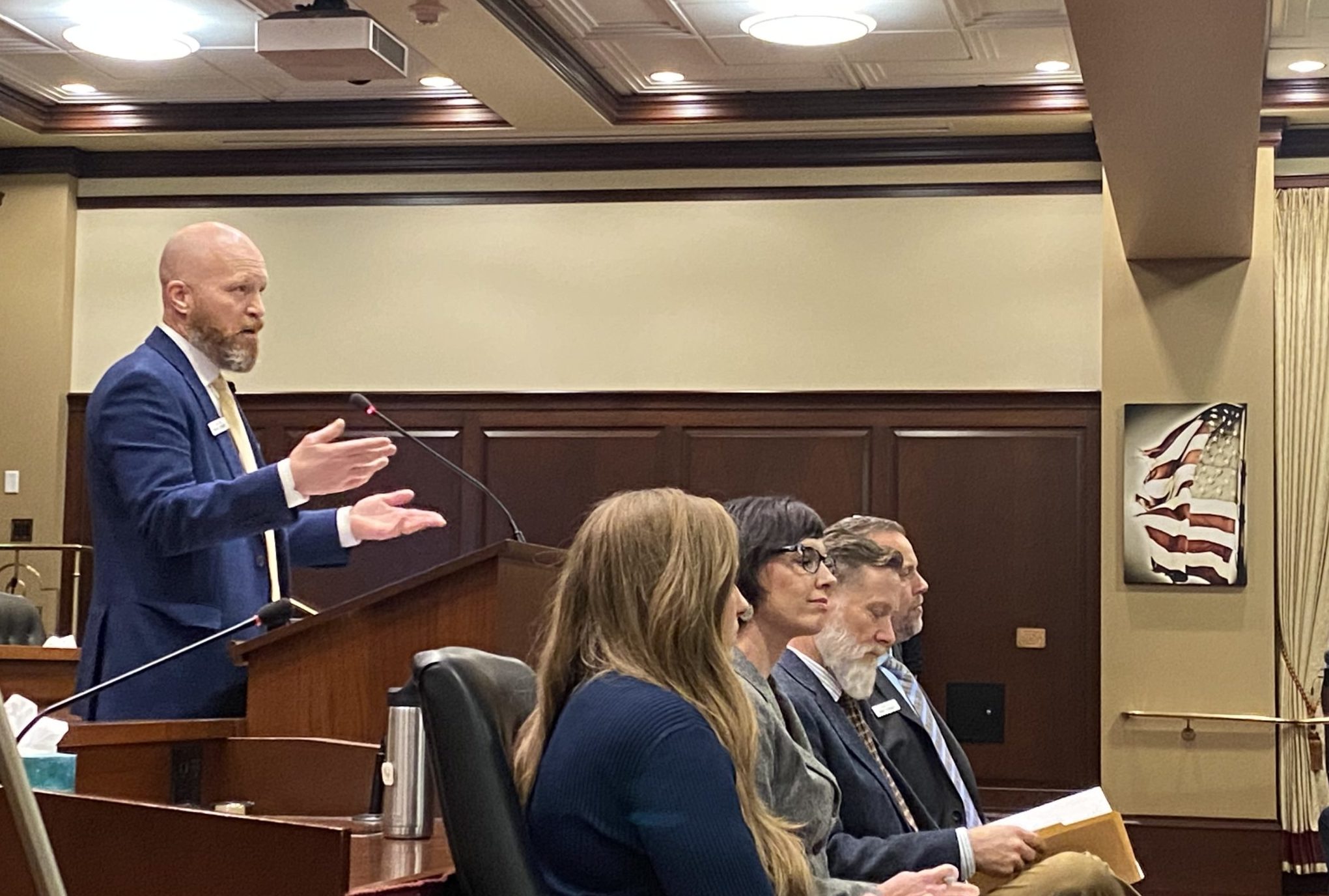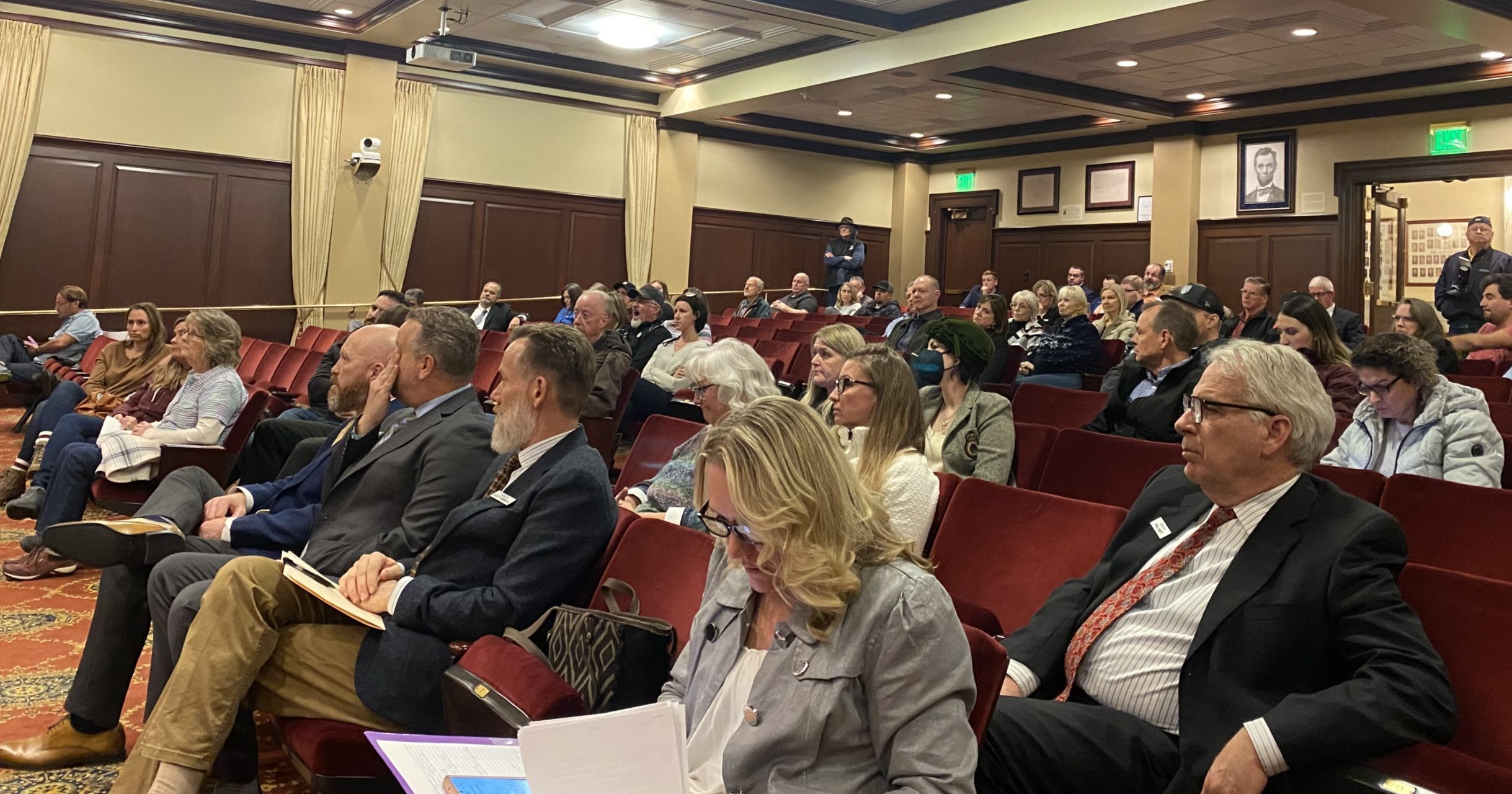Lawmakers will see at least one education savings account bill this session.
Sens. Tammy Nichols, R-Middleton, Ben Toews, R-Coeur d’Alene, Scott Herndon, R-Sagle, and Brian Lenney, R-Nampa, presented an ESA draft legislation at the Statehouse Thursday night. The slate of conservative lawmakers — all of whom sit on the Senate Education Committee — organized the public town hall meeting to discuss Idaho’s school choice options.
This is the first ESA proposal to emerge publicly from legislators since the 2023 session convened Monday.
The draft legislation was not handed out to the crowd. Instead, Nichols read excerpts from the document to a crowd of around 75 people, with help from Anna Miller, education policy director for the Idaho Freedom Foundation’s Center for American Education.


The draft policy, according to Nichols, would pull around $20 million from the general maintenance and operations fund to establish $5,950 scholarships for families to put toward expenses like private school tuition and fees, technology needs, public charter school uniforms, public school fees or extracurriculars, and a host of other education expenses. The two estimate that around 1% of the student population, which would be 3,112 students, would take advantage of the program in its first year — an approximation they based off of fledgling programs in Arizona, West Virginia and other states — but said lawmakers should expect growth.
The program would be made available to the family of any student who is eligible to enroll in public schools, according to Nichols.
It was not made clear how families would be chosen for the program, or what would happen if more than 1% of the student population applied for a scholarship.
Nichols and Miller pushed back against several common arguments against ESAs, chiefly that the program would divert funds from public schools. According to the two policy writers, if a family used the ESA to send their child to a private school, the original public school would retain 20% of the funding designated for that student under the draft policy.
“It’s a pretty good win, still, for the public school,” Nichols said Thursday night.
And Nichols called the $20 million budget request a “drop in the bucket.”
“If you’re looking at a pie chart of all the money that we’re putting into education, it’s like this little tiny sliver,” she said.
Nichols denied that the draft proposal is a voucher policy, which she views as limited.
“What we’re wanting to accomplish is a universal education savings account that can help all students regardless of income, regardless of where they live, regardless of learning disabilities, etc.,” Nichols said. “We want to encompass all children because we believe that all children should have the ability to have a excellent education and an environment that works best for them, and that their parents maintain control and can utilize those funds as taxpayer funds to be able to service the education of their children.”
State superintendent Debbie Critchfield attended the town hall. Though she had to leave early for another commitment, she heard Nichols’ presentation on the draft legislation.
During Critchfield’s campaign, she was accused of supporting vouchers and other policies that would funnel public funds into private education; ultimately, she said she did not intend to “voucherize” the system.
After Thursday’s event, the new superintendent told EdNews she doesn’t believe the redistribution of public dollars to private education is the “silver bullet” solution to improving student achievement.
But she agrees with lawmakers that public schools aren’t the best choice for every student. Generally, she agrees that schools and student achievement are not where they need to be, and elected officials should focus on improving Idaho education.
She also responded to a comment from Miller, who said Idaho has “zero” school choice policies.
“Idaho has public schools, charter schools, private schools, magnet schools, homeschool(s), and a variety of schooling a parent chooses, including the micro pods Ms. Miller referenced,” Critchfield said. “We have a state micro grant, Empowering Parents, that’s designed to support choices and supplement individual student/family needs…There’s open enrollment within schools for most of our districts. Idaho does not regulate parents in the many educational choices/offerings for their kids.”
ESAs are central in an ongoing debate over public school funding, parental choice and the Idaho Constitution
Influential public education organizations across the state have come out against ESAs, tax credit scholarships and other policies they group into a one-word category — vouchers.
The Idaho School Boards Association, which represents over 800 school board trustees across the state, approved a resolution in November to channel resources into blocking voucher legislation during the 2023 session. The Idaho Education Association, Idaho Association of School Administrators, Idaho Business for Education, and the Southern Idaho Conference of Superintendents have all pushed back against ESA legislation.
Last March, an ESA bill was killed in the House Education Committee. Dubbed the “Hope and Opportunity Scholarship,” the bill would also have allocated $5,950 into ESAs for families to put toward a range of education costs, including private school tuition.
But some lawmakers argued the policy would divert funds from public schools and take away accountability for tax dollars, and questioned whether the bill would violate the Idaho Constitution, which requires lawmakers to “establish and maintain a general, uniform and thorough system of public, free common schools.” Idaho is one of about three dozen states with a Blaine Amendment, which blocks state dollars from entering religious schools. These amendments have been a significant hurdle for school choice advocates across the state.
But a 2020 Supreme Court decision left the reach of Idaho’s Blaine Amendment murky.
The case — Espinoza v. Montana Department of Revenue — decided that Montana families could legally use a state scholarship fund for all private education, including parochial schools, despite the state’s Blaine Amendment.
During the Thursday evening meeting, Lenney said he plans to introduce a constitutional amendment to repeal the Blaine Amendment. And a leadership change at the attorney general’s office could result in shifting interpretations on legal issues like school choice.
Most attendees supported the senators’ proposal
The crowd of around 75 people floated more than a dozen questions and comments Thursday night.
One attendee asked Nichols and Miller why public schools get to keep 20% of the funding under the draft ESA policy.
“Let’s just say that there’s a hypothetical conservative out there that does not want to fund public education,” he said, garnering chuckles from the crowd. “They don’t want the 20% going to public schools, and I’m not saying it shouldn’t be that way, but I’m asking why not just make 100% go?”
The answer, according to Nichols and Miller, is regulations and politics. Federal and local dollars have to stay with the district, and it’s not considered “best practice” in school policy to divert all funding from public schools.
“And it proves conservatives don’t want to defund public schools completely,” Toews said.
One attendee, a self-proclaimed member of the Idaho Freedom Foundation, stood and urged the lawmakers and crowd to get involved in their local districts, citing Monday’s contentious Caldwell School Board meeting that ended in chaos amidst a discussion of a policy supporting LGBTQ+ students.
“You guys need to be involved in this or we’re going to get run over,” he said. “We are going to be destroyed, and they’re groomers and they’re trying to tear our children apart.”
He also asked about support for school choice policies within the Legislature.
Nichols believes there is a strong consensus in the House, and with a more conservative Senate Education Committee, the policy is likely to receive more support, she said. Later she added that she hopes Gov. Brad Little will be on board with the policy if it makes it to his desk.
In his State of the State address Monday, the governor proposed an ambitious education agenda, but largely skirted around school choice policy. The only choice-related line item included in his budget was making permanent the Empowering Parents grant program, which provides scholarships for families to put toward education-related needs, like technology or tutoring. As of now, the scholarships cannot be funneled into private education.
Little also reminded Idahoans in his address of the school choice options that are already available, including public charters, magnet schools, private schools, homeschooling and online learning options.
The senators’ ESA draft got some pushback from the crowd.
Josi Christensen, a former Democratic candidate for the Legislature and self-defined Christian, asked the senators if they’d support the use of ESAs for non-Christian religious education, a program targeted specifically toward LGBTQ+ students, or a Satanic school.
“My first response to that would be, how do you think Christians feel about spending tax dollars on an existing public education system?” Miller responded, getting applause from the crowd. “Part of the problem with public education is that we’re always going to be funding something that you disagree with … We’re already funding many ideologically corrupt ideas. This is about choice, and it’s not about discriminating between those choices.”
Nichols compared the draft ESA legislation to existing welfare programs.
“We have welfare programs where we provide food stamps,” Nichols said. “We don’t force people to go to just one grocery store. We allow them to go to whatever grocery store they would like to go to.”
One homeschooling mom said she appreciated the senators’ desire to expand choice, but reminded the crowd of the options Idaho already provides. She also voiced concerns about tax dollar accountability and government regulations.
“I don’t want my taxpayer dollars to be unaccounted for, and neither do any of you,” she said. “I think we would all agree that we expect our legislators when they fund something to have accountability for those funds…I just want to remind everybody, free money isn’t free, and there’s always strings attached no matter how good it sounds.”
